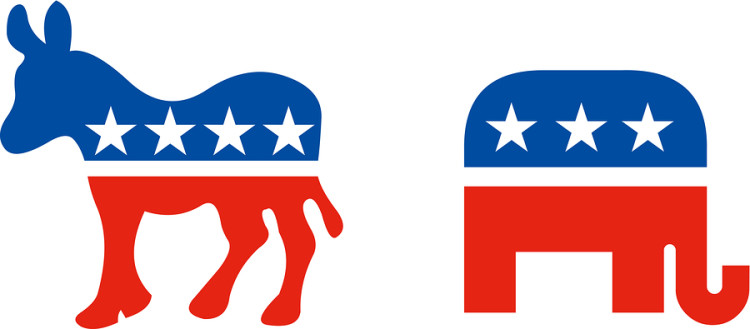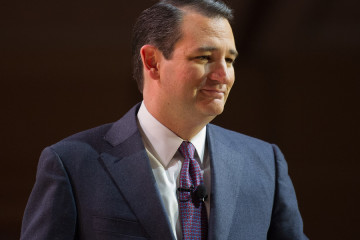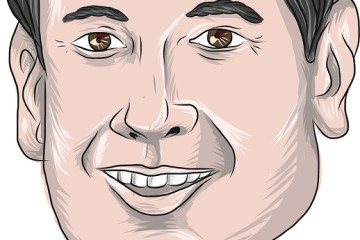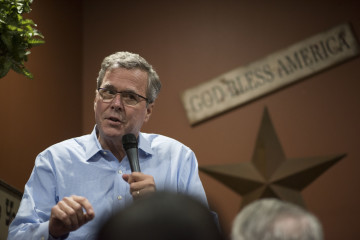The Presidential Campaign Will Soon Be Over: Francis Wilkinson

©2015 Bloomberg View
NN6A8W6JTSE9
(Bloomberg View) — American elections are being outsourced. The Associated Press and National Journal have each reported that former Florida Governor Jeb Bush’s nascent presidential campaign is about to do something as logical and inevitable as it is alarming: entrust the thrust and parry of the campaign to a super-PAC run by Mike Murphy, his chief strategist.
Murphy is one of the most shrewd and successful strategists in the Republican Party. Top advisers to Senator Rand Paul and Governor Scott Walker have also headed to super-PACs supporting their respective principals, rather than hunkering down at campaign headquarters. The moves are not about personnel but power: In presidential politics the gravity has shifted from the actual campaigns to outside groups funded by mega-donors.
That may not mean a whole lot in terms of campaign strategy; super-PACS were already prominent in 2012. But it gives enormous power to individual donors. The 2012 Republican presidential primary dragged on for weeks due to the whims of two extremely wealthy individuals — Sheldon Adelson and Foster Friess, whose contributions to groups making independent expenditures kept the doomed candidacies of Newt Gingrich and Rick Santorum, respectively, up and running.
Individual contributions to a campaign for federal office are capped at $2,700 each for the primary and general elections. But super-PACs and “social welfare” groups can raise and spend unlimited sums. Allies of Texas Senator Ted Cruz claim that he has commitments of $31 million. Supporters of Florida Senator Marco Rubio say he will begin his quest for the presidency with at least $40 million in a super-PAC kitty. Hillary Clinton will no doubt be well-armed.
Putting Murphy in charge of Bush’s super-PAC would be a tacit acknowledgement that a presidential campaign — the complex network of fundraising, field organizing, advertising, news management, and cultivation of political and business insiders — is no longer the main event. In the post-Citizens United environment, the heavy lifting will be outsourced to an allied group funded by mega-millionaires. (Given the egos that often accompany big donations, it may require someone of Murphy’s stature to keep the donors from meddling.) Perhaps someday we’ll see campaigns reduced to a small retinue serving the candidate and spouse while the real work takes place elsewhere.
Campaign law prohibits super-PACs from coordinating with campaigns. (That’s one very good reason why Bush and Walker have yet to officially declare their candidacies.) It’s unclear, however, why anyone would take that law especially seriously. There is little to prevent anyone running a super-PAC from observing the letter of the law while vital strategic information nevertheless finds its appointed target. Perhaps a super-PAC strategist will casually confide in a friend. And that friend will confide in another well-chosen friend. People gossip. That’s life. It’s certainly politics. But is it illegal?
Even if it is, no one really believes that the Federal Election Commission, an agency so dysfunctional that it long ago crossed the border of self-parody, will take enforcement action. Would the Justice Department want to jump into the middle of a presidential election? Not likely.
Money is power. So when money moves to super-PACs, power inevitably accompanies it. Rich people who bundle multiple contributions are now outclassed by billionaires who write a single massive check. It’s a bizarre way for politics to operate in a broad-based democracy. But it’s a function of the heightened stake that the ultra-wealthy now feel in the political system — and of the muddled laws that govern that system.
The power shift will inevitably change the texture of elections. Negative ads may be even more common, and slightly more vicious. (After all, the candidate isn’t technically responsible for them. It was the super-PAC what done it.) The 2016 Republican primary, featuring stronger and better-funded candidates than 2012, may resemble total war. Meanwhile, the disruptive potential of a plutocrat bearing a checkbook and a grudge remains enormous, and the desire of candidates to please the super-wealthy — including “audition” for their support — will only grow more unseemly.
The result may look like a robo-campaign, operating of its own accord via super-PAC. But it won’t be. It will be a campaign funded almost exclusively by the ultra-rich. The super-PAC captains may be mindful of the welfare of 320 million Americans. And perhaps even a few mega-donors will want a more equitable distribution of the power and wealth that has accrued to them. But money — crazy big money — is doing the talking here. And it’s about to get very loud.
To contact the author on this story: Francis Wilkinson at fwilkinson1@bloomberg.net To contact the editor on this story: Zara Kessler at zkessler@bloomberg.net
For more columns from Bloomberg View, visit http://www.bloomberg.com/view






No Comment